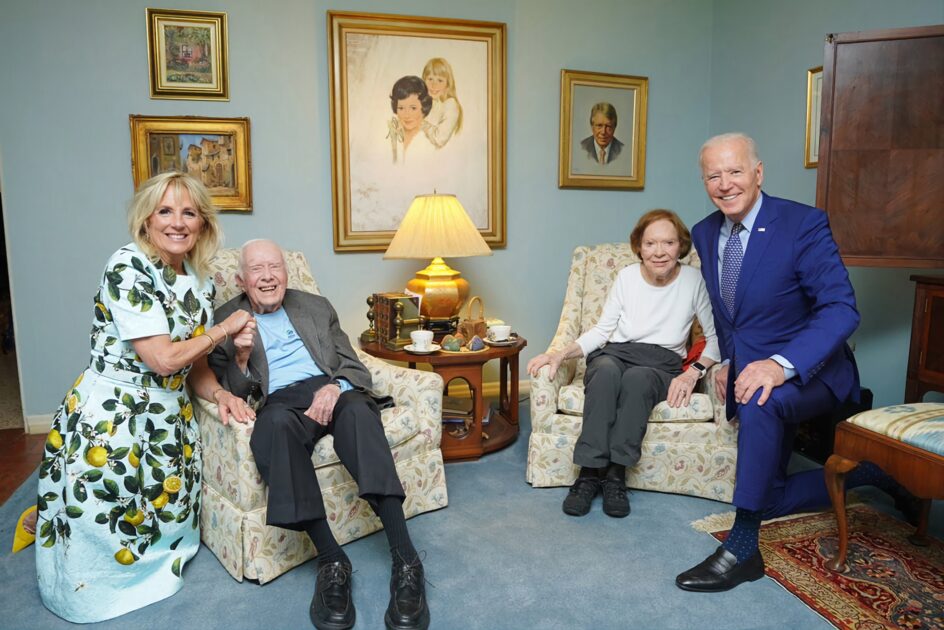From Small-Town Roots to Global Impact: The Inspiring Journey of Jimmy Carter, America’s Longest-Lived President, Nobel Peace Prize Winner, and Humanitarian Icon
Jimmy Carter (1994-2024), the 39th president of the United States, is not only celebrated for his political achievements but also for his remarkable post-presidential legacy. Born on October 1, 1924, in Plains, Georgia, Carter has lived an extraordinary life spanning over a century. As of today, he holds the record as the longest-lived U.S. president in history, leaving an indelible mark on American politics and global humanitarian efforts.
Early Life and Naval Career

James Earl Carter Jr. grew up in the rural farming community of Archery, Georgia. His father, James Earl Carter Sr., was a farmer and businessman, while his mother, Lillian Gordy Carter, worked as a registered nurse. After attending public schools, Carter pursued higher education, earning a Bachelor of Science degree from the United States Naval Academy in 1946. Carter married Rosalynn Smith on July 7, 1946, in the Plains Methodist Church, the church of Rosalynn’s family.

Carter served in the U.S. Navy, specializing as a submariner in both the Atlantic and Pacific fleets. He was later selected by Admiral Hyman Rickover to join the nuclear submarine program, where he studied reactor technology and nuclear physics at Union College. However, following his father’s death in 1953, Carter left the Navy to manage the family’s peanut farm in Plains.
Political Rise and Presidency
Carter’s political journey began with a successful bid for the Georgia State Senate in 1962. Though he lost his first gubernatorial campaign in 1966, he rebounded by winning the governorship in 1970 and became the 76th Governor of Georgia. Carter’s tenure as Georgia’s governor was marked by a focus on racial equality and government efficiency.

In 1976, Carter launched a presidential campaign emphasizing honesty and transparency, capturing the Democratic nomination and ultimately defeating incumbent Gerald Ford. Carter served as the 39th president from January 20, 1977, to January 20, 1981.

Key Achievements as President
Carter’s presidency was defined by significant foreign policy accomplishments:
- Camp David Accords: Facilitated a historic peace agreement between Egypt and Israel.
- SALT II Treaty: Advanced arms control with the Soviet Union.
- Diplomatic Relations with China: Normalized ties with the People’s Republic of China.
- Human Rights Advocacy: Promoted democracy and human rights worldwide.
On the domestic front, Carter established the Department of Energy and the Department of Education, enacted comprehensive environmental protections, and championed deregulation in key industries.
Post-Presidency: A Humanitarian Legacy
After leaving office, Carter’s impact only grew. He authored 32 books, ranging from memoirs and poetry to reflections on religion and politics. Notable titles include Keeping Faith: Memoirs of a President, Palestine Peace Not Apartheid, and A Full Life: Reflections at Ninety.
Carter and his wife, Rosalynn, devoted decades to volunteer work with Habitat for Humanity, helping build homes for those in need. Carter also taught Sunday school at the Maranatha Baptist Church in Plains and continued advocating for peace, democracy, and health initiatives globally through the Carter Center, founded in 1982.

Nobel Peace Prize and Family Life
Carter was presented with the Presidential Medal of Freedom, the nation’s highest civilian honor, during a ceremony at the Carter Center in Atlanta Monday, Aug. 9, 1999.

In 2002, Carter was awarded the Nobel Peace Prize for his “decades of untiring effort” to advance peace, democracy, and economic development.

The Carters have four children, their eldest, John William “Jack” Carter, in 1947, followed by son James “Chip” Carter in 1950, and son Donnel Jeffrey “Jeff” Carter in 1952. Their daughter, Amy Carter, completed the family in 1967. They also have numerous grandchildren, and great-grandchildren, exemplifying a life centered on family values.

Recent Years and Legacy

In February 2023, Carter chose to spend his remaining days in hospice care at home in Plains surrounded by loved ones after being diagnosed with melanoma in 2015 that metastasized to his brain and liver. His enduring legacy includes his relentless pursuit of peace, environmental stewardship, and unwavering commitment to humanitarian causes.
Death and Tributes
On November 17, 2023, his wife Rosalynn Carter entered hospice care. Her health had been failing amid a urinary tract infection which had not improved with antibiotics. She died two days later at her home in Plains, Georgia, at age 96. Jimmy Carter passed away on December 29th 2024, at 100 years and surrounded by family in his beloved hometown of Plains, Georgia. World leaders, former presidents, and citizens worldwide mourned his loss, reflecting on his profound impact on global peace and human rights. His funeral, attended by dignitaries and admirers, celebrated a life dedicated to service and compassion.
A Life Well-Lived

Jimmy Carter’s life was a testament to leadership rooted in compassion and humility. From the peanut fields of Georgia to the global stage, his journey inspired generations. As the world bids farewell to America’s longest-lived president, his legacy will continue to influence future leaders and humanitarian efforts.
FACT: Jimmy and Rosalynn Carter are the longest-married presidential couple in U.S. history, a partnership spanning more than 77 years. Their enduring bond and shared dedication to public service are as remarkable as their individual achievements.

As a leader and humanitarian, Jimmy Carter’s life is a testament to the power of compassion, resilience, and dedication. His story continues to inspire generations worldwide.











Join our Channel...